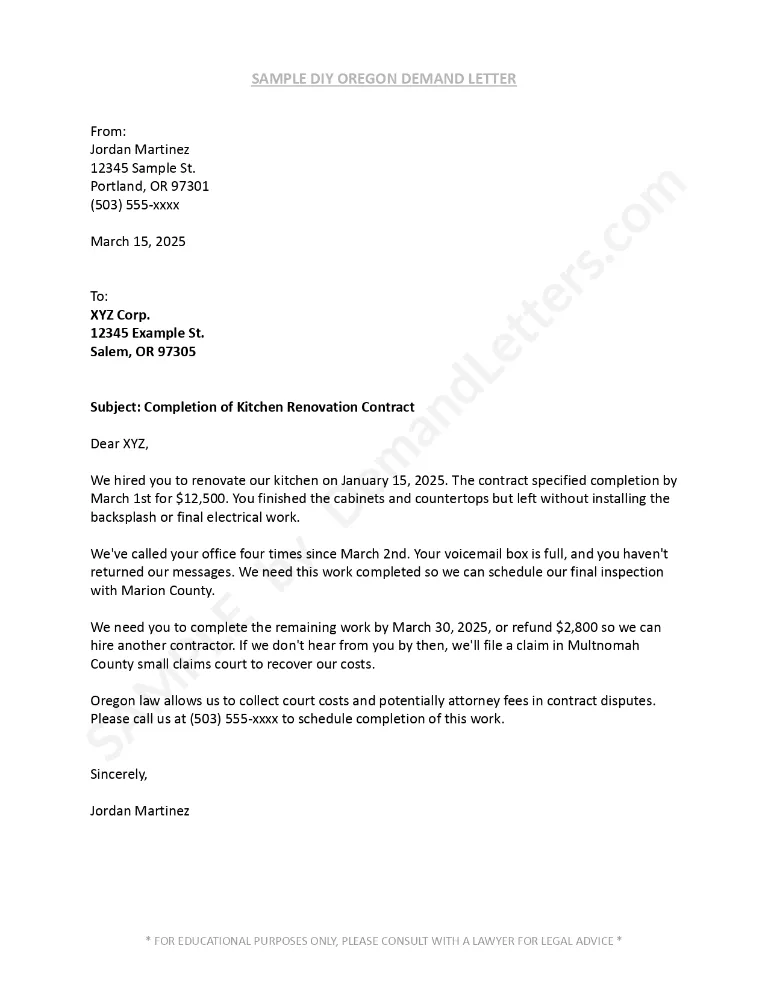
Here’s how to send a demand letter in Oregon if you’ve been wronged:
- Figure out exactly what you want (money, completed work, returned property, etc.)
- Write down all the important facts about what happened and when
- State your demand clearly and set a deadline for them to respond
- Include your contact information so they can reach you
- Send the letter by certified mail so you have proof they received it
Want to skip the hassle? How about adding some real backing to your letter? Have an Oregon attorney write and send your letter for one flat fee of $299 by clicking the link below, and receive professional results that people actually take seriously.
What we’ll cover:
- Writing a demand letter in Oregon
- Oregon sample demand letter
- Oregon’s small claims court
- Small personal injury cases in Oregon
- Professional help vs. doing it yourself
Writing a Demand Letter in Oregon
If you’re writing a demand letter on your own, start with the obvious stuff. Put today’s date at the top. Write the recipient’s full name and address, and include your contact information so they can respond to you.
Now tell your story, but stick to facts. When did you hire them? What did they agree to do? When did they stop showing up? How much do they owe you? Leave out how angry or frustrated you are; courts care about what happened, not how you feel about it.
Be specific about what you want and avoid saying things like “make this right” or “do the right thing.” Say exactly what needs to happen. “Complete the kitchen remodel according to our signed contract,” or “Pay the outstanding balance of $2,400 shown on Invoice #567.”
Give them enough time to actually respond. Two weeks is usually fair for most situations, but it could be three weeks if it’s a complicated situation. A short deadline might feel too aggressive, and a month might make you look like you’re not serious.
Finally, tell them what happens next if they ignore you. Most people write something vague, like “I’ll take legal action.” Better to be specific: “I will file a claim in Oregon small claims court to recover this money plus court costs.”
Oregon Sample Demand Letter
Oregon’s Small Claims Court
When your letter doesn’t work, the Oregon small claims court might be your next stop. You can sue for up to $10,000. Filing costs approximately $37 in most counties, although some, such as Multnomah and Washington Counties, charge more for larger claims. No lawyers allowed unless both sides agree.
Before you file, Oregon requires you to prove you tried to collect the money first. Your demand letter counts as proof. Whether you’re filing in Clackamas County Circuit Court or Jackson County Justice Court, the clerk will make you swear under oath that you made this effort.
You need the defendant’s exact legal name. If it’s a business, check with Oregon’s Secretary of State to get the official name and registered agent.
You can’t serve the papers yourself. Most people use the sheriff for about $50. The defendant gets 14 days to respond. They can pay you, ask for a hearing, or file their own claim against you.
Oregon makes everyone try mediation first in many counties. A volunteer helps you negotiate, and if that doesn’t work, you get a hearing with a judge. Bring everything to your hearing, including contracts, receipts, photos, and your demand letter.
Winning feels good, but collecting the money is a separate battle. Oregon gives you tools like wage garnishment and property liens, but you have to pursue them yourself. This is true whether you win in Lane County or Deschutes County — the court gives you a judgment, but you do the collecting.
Small Personal Injury Cases in Oregon
Oregon has a law, known as ORS 20.080, that many people are unaware of. If someone hurt you or damaged your property and it’s worth less than $10,000, this law can make your demand letter incredibly powerful.
The law works like this: You send a proper demand letter asking for money. If they ignore you or make a terrible offer, you can sue them. When you win more than they offered, they have to pay your lawyer bills on top of everything else.
Here’s an example of how this might work: let’s say you get rear-ended on I-5 near Eugene, your neck hurts, and medical bills are $3,000. Insurance offers you $800. You send a demand letter asking for $6,000. They stick with their $800 offer. You take them to court and win $5,500. Now they owe you $5,500 plus maybe $15,000 in attorney fees.
The critical requirements for your demand letter:
- Must include all your medical records and bills (for injury cases) or property damage documentation (for property cases) — but only if this information is in your possession or reasonably available to you
- Must be sent to both the defendant and their insurance company (if you know who the insurer is)
- Must give them exactly 30 days to respond before you can file a lawsuit
- Miss any of these requirements, and you might lose the protection
The insurance company or defendant must make their offer before your lawsuit is actually filed and served. Once you file the lawsuit, they can’t cut off your attorney fees by making a late offer — the fees will keep adding up until the case is resolved.
Oregon created ORS 20.080 because insurance companies used to automatically fight every small claim, knowing most injured people couldn’t afford lawyers. This law levels the playing field by making it risky for insurers to lowball legitimate small claims.
Defense attorneys warn insurance companies that any demand letter seeking $10,000 or less should be taken seriously and acted on quickly, even if it doesn’t specifically mention the statute by name.
If you’re unsure about what to do or how this works, consult an Oregon-licensed attorney. The technical requirements matter, and getting them wrong can cost you the right to recover attorney fees.
Professional Help vs. Doing It Yourself
Writing demand letters for simple situations is pretty straightforward, but Oregon’s laws have specific requirements that matter. Miss them and you might lose important rights.
For simple collection issues under $500, a well-written DIY letter often works fine. For bigger money or complicated situations, professional help makes sense. Personal injury cases under $10,000 almost always benefit from professional letters because the ORS 20.080 requirements are so specific.
Our service eliminates the guesswork. You answer questions about your situation, and a licensed Oregon attorney handles the rest. Flat fee pricing means no surprises.
Think about your time, too. Researching Oregon law, figuring out what to include, getting the wording right — it takes hours. Professional help often costs less than your time is worth, especially when attorney-written letters get better results.
Professional letters also carry weight. When someone sees a law firm letterhead, they know you’re serious about following through.
This article provides general educational information about Oregon law and is not legal advice. Laws change frequently, and this information may not be current, accurate, or applicable to your specific situation. Do not rely on this information for legal decision-making without consulting a qualified Oregon attorney

